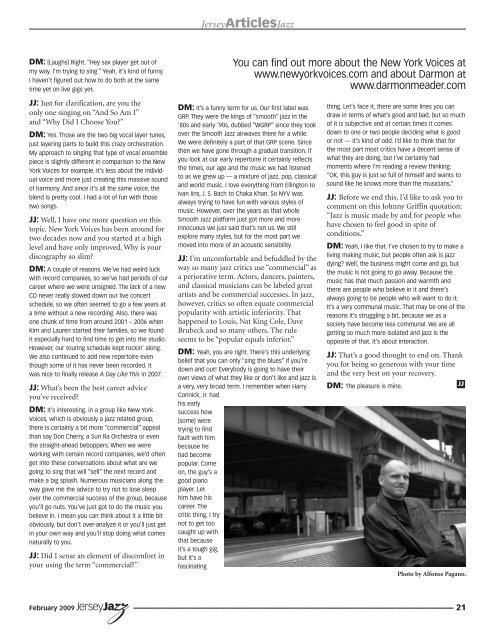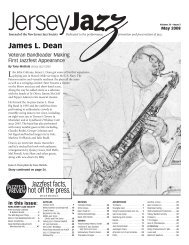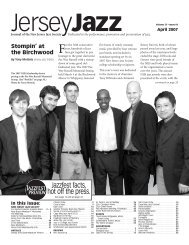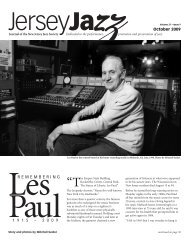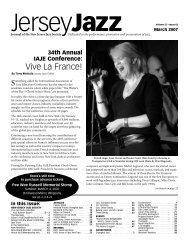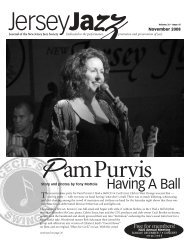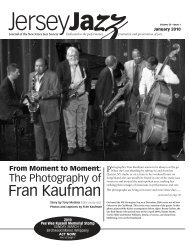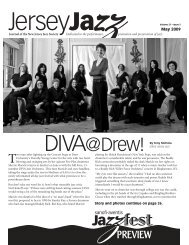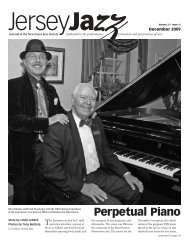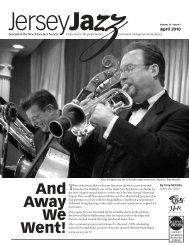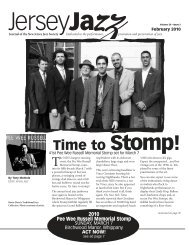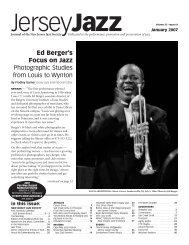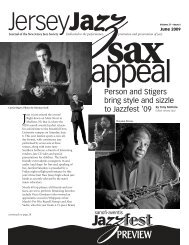He's Back! - New Jersey Jazz Society
He's Back! - New Jersey Jazz Society
He's Back! - New Jersey Jazz Society
Create successful ePaper yourself
Turn your PDF publications into a flip-book with our unique Google optimized e-Paper software.
DM: [Laughs] Right. “Hey sax player get out of<br />
my way. I’m trying to sing.” Yeah, it’s kind of funny.<br />
I haven’t figured out how to do both at the same<br />
time yet on live gigs yet.<br />
JJ: Just for clarification, are you the<br />
only one singing on “And So Am I”<br />
and “Why Did I Choose You?”<br />
DM: Yes. Those are the two big vocal layer tunes,<br />
just layering parts to build this crazy orchestration.<br />
My approach to singing that type of vocal ensemble<br />
piece is slightly different in comparison to the <strong>New</strong><br />
York Voices for example. It’s less about the individual<br />
voice and more just creating this massive sound<br />
of harmony. And since it’s all the same voice, the<br />
blend is pretty cool. I had a lot of fun with those<br />
two songs.<br />
JJ: Well, I have one more question on this<br />
topic. <strong>New</strong> York Voices has been around for<br />
two decades now and you started at a high<br />
level and have only improved. Why is your<br />
discography so slim?<br />
DM: A couple of reasons. We’ve had weird luck<br />
with record companies, so we’ve had periods of our<br />
career where we were unsigned. The lack of a new<br />
CD never really slowed down our live concert<br />
schedule, so we often seemed to go a few years at<br />
a time without a new recording. Also, there was<br />
one chunk of time from around 2001 – 2006 when<br />
Kim and Lauren started their families, so we found<br />
it especially hard to find time to get into the studio.<br />
However, our touring schedule kept rockin’ along.<br />
We also continued to add new repertoire even<br />
though some of it has never been recorded. It<br />
was nice to finally release A Day Like This in 2007.<br />
JJ: What’s been the best career advice<br />
you’ve received?<br />
DM: It’s interesting, in a group like <strong>New</strong> York<br />
Voices, which is obviously a jazz related group,<br />
there is certainly a bit more “commercial” appeal<br />
than say Don Cherry, a Sun Ra Orchestra or even<br />
the straight-ahead beboppers. When we were<br />
working with certain record companies, we’d often<br />
get into these conversations about what are we<br />
going to sing that will “sell” the next record and<br />
make a big splash. Numerous musicians along the<br />
way gave me the advice to try not to lose sleep<br />
over the commercial success of the group, because<br />
you’ll go nuts. You’ve just got to do the music you<br />
believe in. I mean you can think about it a little bit<br />
obviously, but don’t over-analyze it or you’ll just get<br />
in your own way and you’ll stop doing what comes<br />
naturally to you.<br />
JJ: Did I sense an element of discomfort in<br />
your using the term “commercial?”<br />
February 2009<br />
<strong>Jersey</strong>Articles<strong>Jazz</strong><br />
You can find out more about the <strong>New</strong> York Voices at<br />
www.newyorkvoices.com and about Darmon at<br />
www.darmonmeader.com<br />
DM: It’s a funny term for us. Our first label was<br />
GRP. They were the kings of “smooth” jazz in the<br />
’80s and early ’90s, dubbed “WGRP” since they took<br />
over the Smooth <strong>Jazz</strong> airwaves there for a while.<br />
We were definitely a part of that GRP scene. Since<br />
then we have gone through a gradual transition. If<br />
you look at our early repertoire it certainly reflects<br />
the times, our age and the music we had listened<br />
to as we grew up — a mixture of jazz, pop, classical<br />
and world music. I love everything from Ellington to<br />
Ivan Iins, J. S. Bach to Chaka Khan. So NYV was<br />
always trying to have fun with various styles of<br />
music. However, over the years as that whole<br />
Smooth <strong>Jazz</strong> platform just got more and more<br />
innocuous we just said that’s not us. We still<br />
explore many styles, but for the most part we<br />
moved into more of an acoustic sensibility.<br />
JJ: I’m uncomfortable and befuddled by the<br />
way so many jazz critics use “commercial” as<br />
a perjorative term. Actors, dancers, painters,<br />
and classical musicians can be labeled great<br />
artists and be commercial successes. In jazz,<br />
however, critics so often equate commercial<br />
popularity with artistic inferiority. That<br />
happened to Louis, Nat King Cole, Dave<br />
Brubeck and so many others. The rule<br />
seems to be “popular equals inferior.”<br />
DM: Yeah, you are right. There’s this underlying<br />
belief that you can only “sing the blues” if you’re<br />
down and out! Everybody is going to have their<br />
own views of what they like or don’t like and jazz is<br />
a very, very broad term. I remember when Harry<br />
Connick, Jr. had<br />
his early<br />
success how<br />
[some] were<br />
trying to find<br />
fault with him<br />
because he<br />
had become<br />
popular. Come<br />
on, the guy’s a<br />
good piano<br />
player. Let<br />
him have his<br />
career. The<br />
critic thing, I try<br />
not to get too<br />
caught up with<br />
that because<br />
it’s a tough gig,<br />
but it’s a<br />
fascinating<br />
thing. Let’s face it, there are some lines you can<br />
draw in terms of what’s good and bad, but so much<br />
of it is subjective and at certain times it comes<br />
down to one or two people deciding what is good<br />
or not — it’s kind of odd. I’d like to think that for<br />
the most part most critics have a decent sense of<br />
what they are doing, but I’ve certainly had<br />
moments where I’m reading a review thinking:<br />
“OK, this guy is just so full of himself and wants to<br />
sound like he knows more than the musicians.”<br />
JJ: Before we end this, I’d like to ask you to<br />
comment on this Johnny Griffin quotation:<br />
“<strong>Jazz</strong> is music made by and for people who<br />
have chosen to feel good in spite of<br />
conditions.”<br />
DM: Yeah, I like that. I’ve chosen to try to make a<br />
living making music, but people often ask is jazz<br />
dying? Well, the business might come and go, but<br />
the music is not going to go away. Because the<br />
music has that much passion and warmth and<br />
there are people who believe in it and there’s<br />
always going to be people who will want to do it.<br />
It’s a very communal music. That may be one of the<br />
reasons it’s struggling a bit, because we as a<br />
society have become less communal. We are all<br />
getting so much more isolated and jazz is the<br />
opposite of that. It’s about interaction.<br />
JJ: That’s a good thought to end on. Thank<br />
you for being so generous with your time<br />
and the very best on your recovery.<br />
DM: The pleasure is mine.<br />
JJ<br />
Photo by Alfonse Pagano.<br />
_________________________________ 21


